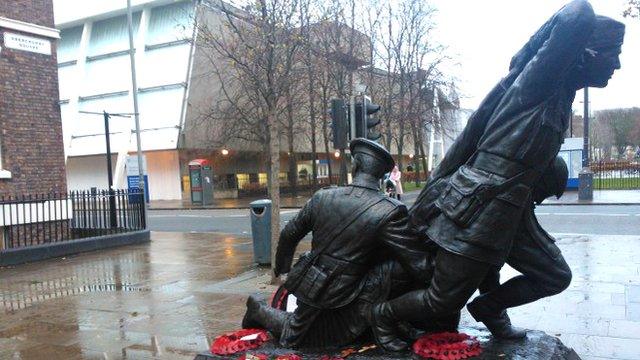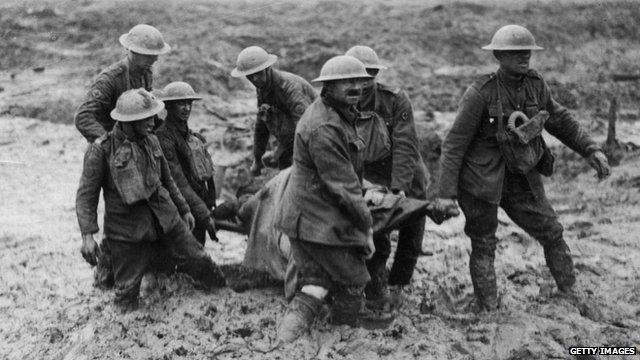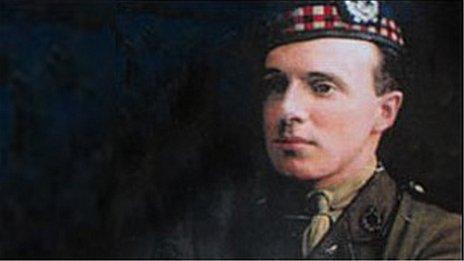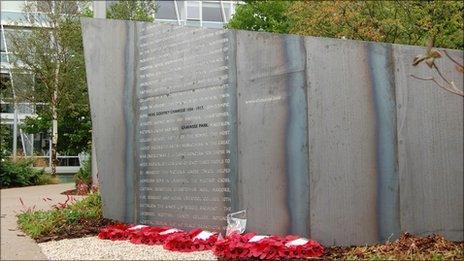World War One: Noel Chavasse the double VC-winning medic
- Published

Noel Chavasse was awarded his second VC posthumously - he also won the Military Cross
The only soldier to be awarded the Victoria Cross (VC) twice during World War One was a doctor, a sportsman and the son of the Bishop of Liverpool. Noel Chavasse is one of only three men to win the medal twice since it became the highest award for gallantry in 1856.
"Gee! He did work! I was beginning to think he was not human, because nothing made him flinch or duck.
"The first wound that he received was in the head, and all he did was to take his tin hat off, put a bandage around his head, and carry on.
"This he did all day and all night until the next wound he got, in the side, did for him."
That was how a soldier from Liverpool who was with Noel Chavasse on the day he was killed summed up his courage.
The soldier added that a VC was "too small a reward for such a man".
Capt Chavasse won the VC twice, the conclusions to the citations for both awards highlighting his bravery while treating wounded men.
"He saved the lives of some 20 badly wounded men, besides the ordinary cases which passed through his hands. His courage and self-sacrifice were beyond praise." London Gazette, October 1916.
"By his extraordinary energy and inspiring example was instrumental in rescuing many wounded who would have otherwise undoubtedly succumbed under the bad weather conditions. This devoted and gallant officer subsequently died of his wounds." London Gazette, September 1917.

The memorial to Noel Chavasse stands in Abercromby Square, the family home when his father was the Bishop of Liverpool
Capt Chavasse, who was born in Oxford, packed a lot into a life which ended, at the age of 32, in a captured German dugout during the Battle of Passchendaele, also known as the Third Battle of Ypres.
He was a prize-winning academic, qualified as a doctor, played rugby and represented Great Britain in the 1908 Olympics, running alongside his twin brother, Christopher, in the 400m.
In 1913, he joined the 10th Battalion of the King's (Liverpool) Regiment - a kilted territorial battalion known as the Liverpool Scottish.
At the outbreak of war his letters reveal that, like so many of the country's young men, he was champing at the bit to get into action.
"If ever I get sent to the front with a regiment, I shall almost shed tears of joy," he wrote in August 1914.
"I do envy Chris going off so soon, but I think this dog is going to have his day soon too."
Indeed, by November he was in France, although seeing little danger in his imminent spell in the frontline.
"I believe that doctors are not allowed in the trenches, so really I shall run very little risk at all unnecessarily, my blood is not heroic," he said.
Just a month later though, he had witnessed the full horrors of trench warfare.
"Next evening, the men came out of the trenches," he wrote. "The young men were haggard, white, and stooped like old men, but they had done gallantly.
"We all hate the war worse than we thought we could."
And by 1916, two years of witnessing the bitter fighting had given his letters a very different tone.
"I shall be glad of a holiday," he wrote. "Do you know I have been in the line with a regiment for 15 months now and I seem to get tired more easily and don't seem to be so keen.
"It is only the faces of the men that keep me anxious to help them at all times."
By that point he has disproved his own assertion that he was "not heroic".
He had won the Military Cross in 1915 in the fighting around Ypres, and the VC during the Battle of the Somme in 1916.

Stretcher bearers carrying a wounded man through the mud near Boesinghe, 1 August 1917
His luck finally ran out as the Liverpool Scottish struggled through mud and rain to take a German strongpoint during the Third Battle of Ypres in 1917 - better known as Passchendaele.
Bill Sergeant, who raised money for a statue in Liverpool in memory of Noel Chavasse, said he was helping wounded soldiers to the end.
"[He] had been wounded himself and the bunker was the ideal place to treat wounded soldiers so they brought them in there," he said.
"A German artillery shell came through the back door of the bunker and killed or wounded virtually everyone who was there.
"Chavasse was badly wounded in the stomach but spent the next hours trying to find people to help his colleagues from the Liverpool Scottish.
"He was eventually persuaded to go for treatment himself and he died two days later."
His whole regiment and many other medical officers watched as his body was buried in Brandhoek's New Military Cemetery.
His heroism clearly made a lasting impression on the people of Liverpool - in a BBC poll in 2003 to find the 100 Greatest Merseysiders he came third, above Bill Shankly, George Harrison and William Gladstone, and behind only Ken Dodd and Lennon and McCartney.
The memorial to Liverpool's Heroes, featuring Capt Chavasse, now stands in Abercromby Square, where his family lived.
Mr Sergeant feels the regimental history of the Liverpool Scottish best sums up the legacy of this brave man.
"[It] says the memory of Noel Chavasse may be on his tombstone, may be on a memorial somewhere, but the true memory of him is in the hearts of the men he was looking after, the men of the Liverpool Scottish."
ExploreThe story of Fabian Ware, the founder of the Imperial War Graves Commission, and why we remember the poets, rather than the composers, of WW1.
- Published26 February 2013

- Published4 August 2011
